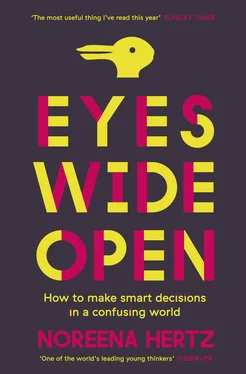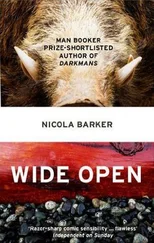Established orders are collapsing all around us.
This isn’t necessarily a bad thing. In an age in which our most famous economics sages failed to predict the financial crisis, in which our intelligence services failed to predict the Arab Spring, in which Facebook groups can prove to be better diagnosticians than medical experts (more on this in Step Six), and in which the tabloidisation of the broadsheet press makes us unable to blindly trust even supposedly respectable papers’ claims, the increasingly competitive information landscape is in many ways positive.
But that is not to say that this trend is categorically good. What are the agendas of these new curators? How trustworthy are they? Which is more likely to steer me to the right hotel – Joe from Idaho’s TripAdvisor testimony, or the advice of my long-trusted travel agent? And while it’s true that Wikipedia is in some subjects now as reliable as the Encyclopaedia Britannica ,28 will the ‘crowd’ always have my best interests at heart?
In a time of disorder, the past can no longer be assumed to be the lodestar for the future, the future cannot easily be foreseen, and accepted truths and conventional curators of information cannot be unquestioningly relied upon.
Disorder can bring about positive change and innovation, but it can also leave us feeling compass-less and uncertain.
It’s really hard to know who to believe. Who to trust. And who to rely on to help us work out what the future will hold.
Get with the Programme – How to Be an Empowered Decision-Maker
OK. You’ve got the picture now. The context in which we have to make decisions is, to say the least, challenging.
And yet, of course, we still have to make choices. I still have to decide which doctor’s advice to follow. The President of the United States still needs to decide whether to strike Iran. The mother hearing her baby cry still needs to decide whether to pick him up or to leave him to cry through the night alone. You still need to decide who to hire for your business, or where to put your retirement funds. We still have to make decisions, important, life-changing decisions, regardless of how distracted we are, how much data swirls around us, how unpredictable and uncertain our world now is. Regardless of how exhausted we feel.
Over time, we’ve developed ways to do just that, developed short cuts and coping strategies – some conscious, some not – for navigating this difficult terrain. Strategies for gathering information and then processing it in ways that fit with the realities of our distracted, deluged, disordered lives.
We must ask ourselves though how good these strategies really are. Most of us are going through life without interrogating whether our decision-making processes are fit for purpose. And that’s something we need to change – especially when the stakes are high and the decisions are of real import.
We need to take more control of our decisions and how we make them. We need to become empowered thinkers.
Without quality information we can trust and effective methods for interrogating it, our decisions are bound to be at best sub-optimal, and at worst very damaging to our needs and interests. So in the coming Steps I’ll be expanding on our information-gathering blind spots, and showing how we can do better.
How attuned are you to the most common flaws in experts’ thinking? How good are you at spotting statistical cons? How quickly are you able to identify a suspect ‘fact’? Is the information you are focusing on the right information to be basing your decision upon? What might be worth considering instead? Which unusual suspects might you turn to for advice?
I’ll be looking into whether you have dug deep enough to establish the truth of your sources. Do you know how to interrogate new sources of digital information? Or how to evaluate the ‘answers’ churned out by computers? Do you know who to trust? And why? I’ll also look in detail at the way our decision-making is being transformed by new online friends and foes, and point out the pitfalls as well as the quick wins.
In an era of disinformation and misinformation, an era of Photoshop, Fox News, personalised search and ever more spin, I will help you discover how best to interrogate your sources and assess the quality of information you are presented with. And how to widen your net in the first place.
I’ll also be investigating the surprising role that we ourselves play in the choices we make, by looking at what’s going on, at a conscious and subconscious level, during the decision-making process.
For we are not the robotic, emotionless, experience-less, rational decision-makers of economic theory. A whole host of visceral processes take place within us – neurons fire, memories swirl, emotions feel – at the same time as the analytical part of our brain churns out its computations. As we will see, this dance between subconscious and conscious, intellect and intuition, profoundly affects the risks we take, the futures we contemplate, the forecasts we make. As does the environment in which we operate. Colour, smell, touch – all impact upon the choices we make, as does the language used. What this means is that our immediate response will often need challenging, however natural or intuitive it may feel.
Given how fast-changing our world is, I’ll also be exploring whether the models and mental maps we currently use remain appropriate. How is the past affecting your current decisions? Is it locking you into particular patterns or behaviours? Is it leading you to make linear predictions? Or are you able to break free from the past when need be, and envisage a very different sort of future?
And have you assembled the right team around you to help you make the toughest decisions? In an age of dispersed knowledge, are you ‘crowd-sourcing’ your information-gathering? Who is in your inner circle? Yes-men or nay-sayers? Who is acting as your ‘challenger’ or your ‘translator’? Are you taking sufficient responsibility for your decisions? Or are you attempting to pass the buck to others?
Throughout the book, I’ll be combining the latest insights from academia – from psychology, behavioral economics, neuroscience, sociology, anthropology and information science – with first-hand insights from a wide range of people who have to make high-stakes decisions on a regular basis – hedge-fund managers and judges, CEOs and politicians, intelligence officers and fighter pilots, doctors and movie producers. By learning from decision-makers who’ve sometimes got things right and sometimes got things very wrong, we will get a better sense of those traits and strategies that can help us be good decision-makers, as well as the moves that can serve us ill.
With some traits, this is not obvious.
Take those super-confident forecasters, the ones who are given inordinate airtime. It turns out that the more confident a forecaster is in his predictions, the worse those forecasts prove to be.29 It’s the same with doctors. You know those overly self-assured ones? I’ve certainly come across some in my time. A number of studies now reveal that the ones who are dead certain in their diagnoses are all too often wrong.30
Sometimes the strategies that work are incredibly simple.
We’ll learn how a board’s decisions can be transformed if the directors are asked to change where they sit.31 We’ll discover how much easier it is to make the right choice when you ask for information to be presented in black and white rather than in colour.32 We’ll learn how we make better decisions if we’ve had a sandwich.33
Winning strategies can be somewhat counter-intuitive. Did you know that you can at times get better advice on how to deal with your illness from a patient than from a doctor? That if you want your team to make smart decisions, you’d do better to make sure they’re at odds with each other for a fair proportion of the time, rather than always be of the same mindset? That rather than listening to your boss, you might be better off rebelling? Or that you might want to wait to empty your bladder until you’ve made your decision?34
Читать дальше












